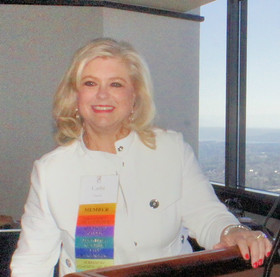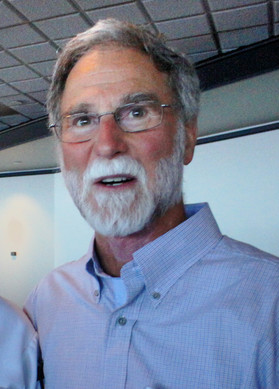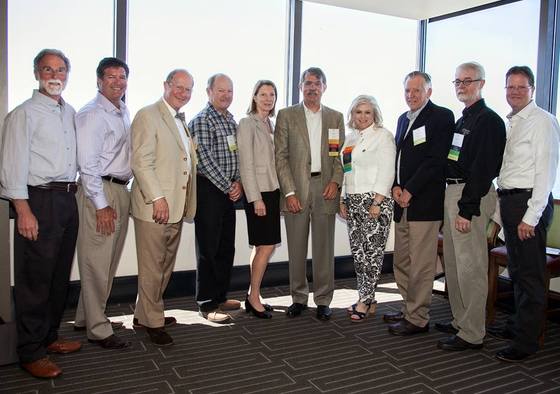Above: Vineyards on Red Mountain. Below: Cathi Hatch, Bob Betz

 Cathi Hatch runs a private investment group called the Zino Society whose membership consists of successful entrepreneurs, wealthy angel investors, and a variety of specialized business consultants. They've raised almost $30 million on behalf of 600 companies, and provided their charges with advice on everything from marketing to "exit strategies." For the past four years, Zino has put on a seminar called the Liquid Assets Forum that brings together the leading lights of the state's beverage industries--wine, beer, spirits--for a day of panel discussions and schmoozing.
Cathi Hatch runs a private investment group called the Zino Society whose membership consists of successful entrepreneurs, wealthy angel investors, and a variety of specialized business consultants. They've raised almost $30 million on behalf of 600 companies, and provided their charges with advice on everything from marketing to "exit strategies." For the past four years, Zino has put on a seminar called the Liquid Assets Forum that brings together the leading lights of the state's beverage industries--wine, beer, spirits--for a day of panel discussions and schmoozing.
The broad strokes: Washington beverages have been on a huge growth spurt. Wine for the last 20 years, beer for the last 10, and craft spirits, well, they're about to really take off as well. Washington wine and beer are both dominated by major players: Chateau Ste. Michelle makes more wine than all the others combined; Red Hook beer produces four out of every seven kegs of beer in the state. That's not necessarily a bad thing, though. Both brands were started by artisans with a lot of passion, and that passion was on display from the Forum's outset: a panel of nine industry "legends."
We know the broad outlines of the story, of course, but it's worth retelling:
- How a wine salesman from Oklahoma named Charles Finkel happened to call on the wine writer Leon Adams in Sausalito. "Look for the Yakima Valley," was his advice. ("Go Northwest, young man!")
- How Finkel then started selling Chateau Ste. Michelle's "American" cabernet sauvignon and did such a good job that he ended up in Woodinville as the winery's sales director.
- How a UW zoology grad named Bob Betz, having lived in Europe, returned home and, looking for a job where he could "speak Winish," dropped off his resumé at Ste. Michelle.
"It's my greatest claim to fame," Finkel joked today, "that I called Bob Betz back."
That was decades ago, of course. Finkel went on to start Merchant du Vin (the first importer of specialty beers) and then launched the Pike Brewery. (Finkel's business partner Paul Shipman and a journalist named Gordon Bowker, meantime, started Red Hook.) Betz spent his first career at Ste. Michelle, becoming a Master of Wine along the way; then had a second career starting, running and eventually selling his own winery, Betz Family Cellars. He travels widely, and knows how many exciting new wine regions are out there, many of them larger than Washington's 45,000 acres (about one and a half times the size of the Napa Valley).
In fact, as Marty Clubb of L'École pointed out, it's positively humbling to attend Vinexpo as part of a Washington wine delegation, which can feel like a tiny speck in four football fields covered with stands occupied by ambitious wine companies, all of them coveting a share of the vast "American market."
Betz's advice was more of a warning. "Don't be myopic," he said. Take the long view. Don't read your own press clippings about your own "world class" wines. Understand where you fit on the international stage. Don't rely on numbers and scores, but create something unique: the concept of wine with a unique character.
It's a goal to keep in mind, along with the minutiae of running a business: water rights, marketing, label approvals, labor law, production and sales reports (in liters, in cases, in gallons, different for every state).
And finally, what happens after the last harvest? What's the exit strategy? Betz lucked out; he found buyers who wanted to keep his "baby" the way he and his wife envisioned it: a family-owned business.
The Lill (DeLille Cellars) and Ferguson (L'École;) families were lucky, too; they both had children who wanted to take over. Tom and Anne-Marie Hedges (Hedges Family Estate) are sharing duties with their adult kids, as is Gary Figgins (Leonetti). But for many, there was no exit strategy: what of Hinzerling? Manfred Vierthaler? Daquila and E.B. Foote? Lost Mountain? Blackwood Canyon? No wonder that law firms like Perkins Coie, Davis Wright Tremaine, Graham & Dunn and Garvey Schubert Barer play such a prominent role in the Zino Society's programs. Better to have a strategy (be it exit or succession) than imagine the vultures fighting over your carcass. Don't be myopic, don't be short-sighted, take the long view. And stay humble.
The panelists, in addition to Betz, Finkel, Clubb, Lill and Hedges, were growers Dick Boushey and Norm McKibben, and brewer Scott Hansen. Photo below.


Leave a comment